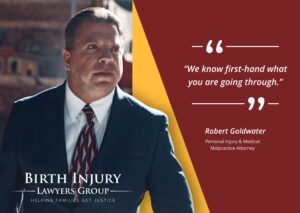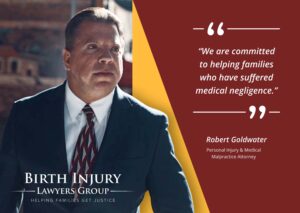
It’s long past time to set aside the antiquated notion that branding is a communication practice reserved for sportswear and breakfast cereals. In 2021, potential customers insist on knowing who you are and what you value.
By Bob Goldwater
It’s no secret that many people are suspicious of attorneys and can’t help but wonder about the presence of hidden motivations when seeking qualified legal counsel. Unfortunately, personal experience has taught me that at least some of these suspicions are justified. The success of my law firm depended in large part on clearly communicating what we are all about and then standing behind those statements. That, in a nutshell, is “branding.”
As I’ve gone about building a network of like-minded attorneys specializing in compassionate representation, I’ve learned branding principles that are relevant for any type of business. What worked well for my law practice can be adapted to help distinguish you from your competitors. Below, I’ve tried to answer a few questions I hear all the time and position my responses so they provide useful insight no matter what business you’re in.
The Centrality of Branding to Growth and Scaling
Many people might think that having a successful legal practice specializing in personal injury would simply be a matter of being well-versed in settled case law and consistently winning in court. As vital as those two aspects are, they’re only part of the complete picture.
Personal branding is absolutely essential in law, or any other profession, if you are hoping to grow and scale your business. When you brand whatever you do effectively, you attract not just the clients you are qualified to serve but also like-minded practitioners who can become part of a growing referral network. Managed well, that network will set in motion a snowball effect that establishes you as a respected, trustworthy voice.
Sadly, there’s no shortage of attorneys who have terrific win-loss records and are well-versed in case law but utterly lacking in compassion and empathy. The practice of law has a very real impact on the lives of individuals so it was important to me, personally, to let clients know that my top priority is people, not billable hours. Far too many attorneys get these priorities reversed.
On my website, as just one example of how I chose to brand, you’ll find the following text: “Bob refuses to sit back while injured people are taken advantage of by big corporations and insurance companies out to make a quick buck.”
That’s a huge statement, and it makes a promise to potential clients. It tells people who I am and how I practice law. In the age of the internet, I want to make sure my brand statements are factual and verifiable. Sending positive brand statements that don’t ring true is not only antithetical to who I am, but it’s a surefire recipe for wrecking your reputation.
"If your child was born with a birth injury, or cerebral palsy, we can help."
The Use of Branding to Guide a Daily Pursuit of Excellence
I don’t necessarily think of the pursuit of legal excellence and effective branding as separate categories. I would say that the pursuit of excellence in any field is the bread and butter of engaging in positive branding.
Lawyers engage in branding by winning cases, naturally, but I think you also say a lot about your brand by the cases you choose to pursue and those you refer out to someone who might better serve the needs of the client. Putting the client’s interests ahead of any perceived self-interest is a significant feature of our brand.
As you build your brand, word-of-mouth will be your best form of marketing. As more and more cases (or customers) land on your doorstep, the value of building a high-quality referral network will become obvious. If you refer out to someone who does not share your client-first perspective, that experience will also become a part of your brand, albeit a negative one.
Authenticity as the Cornerstone of Branding
The practice of personal injury law requires a heightened sensitivity to the mental and emotional lives of clients. Given a cultural backdrop of heightened cynicism and mistrust, it can be tricky to convey empathy through branding without coming off as “slick.”
Your messages have to match your methods. Any PR firm worth its salt can come up with a terrific campaign that emphasizes a caring, personalized approach, but if the everyday reality doesn’t measure up, word will get out fast. The best way I know to convey empathy is to focus on building that specific value into every aspect of your business plan and then using it as a metric for evaluating anyone else you plan to add to your referral network.
Building in the time upfront to get to know your clients is the single best way to relate to them as people, not just case files. You never really know what people are going through unless they open up, and they’re not going to do that if they sense impatience on your part.
I don’t think we can artificially force ourselves to work up feelings one way or another, but thankfully that’s not the primary requirement for providing compassionate service. The first requirement is for leadership to intentionally choose to provide that level of service and hold everyone accountable to that standard. I think if you attempt to convey an emotion that’s not authentic, that’s when you’re in danger of getting labeled “slick.”
"We know first-hand what you are going through."
Branding 101: Characteristics of a Compassionate Law Practice
The primary measuring stick many people use when deciding whether to hire a personal injury attorney is his or her track record of winning cases and securing financial compensation. Money is important, no doubt about it, especially in life-altering cases, but it’s only one measurement of properly caring for the injured.
Let’s assume the attorney you’re considering has a great track record. I would say that a far more critical factor to consider now is whether the attorney places a high value on your comfort before encouraging you to move forward with a case.
If you or any member of your family is not comfortable moving forward, the best default response might be to trust that instinct, at least initially. Here are a few basic questions prospective clients can ask themselves after taking an initial meeting with an attorney:
- Did the attorney spend time informing me of my state-specific rights?
- Did I get 100% clear, satisfactory answers to the questions I had relating to my case?
- Were the answers I received actionable…even if I sign with another law firm?
- Without violating anyone’s confidentiality, did I receive comparative information on cases similar to mine along with an anticipated range of possible outcomes?
- Was I provided with referrals for assistance managing the changes that have occurred in my family’s everyday lifestyle?
- Did I sense a genuine interest in relieving trauma on every front?
When we’re suffering loss, it’s easy to get swept up in the emotion of the moment, but any business that capitalizes on crisis decision-making should be avoided. The best companies want you to speak highly of them long after the heightened emotion of your situation has passed.
"Our Birth Injury Lawyers have recovered over $750+ Million on behalf of our clients."
Your Brand Helps Protect You from Mission Drift and Scope Creep
This may sound overly simplistic, but the best way to stay true to your mission is to have a clearly defined mission statement and make a habit of using it as your guide when making decisions. It sounds simple, but plenty of businesses will draft a statement and then promptly forget about it.
If you can’t clearly articulate the difference between growing and scaling your business and scope creep, then mission drift is bound to occur.
For example, conventional wisdom might lead you to believe that it’s just not possible to grow your business and maintain a consistently high level of concern for each and every client. While it may be true that a lawyer cannot represent hundreds of clients and know them all by first name, he can hold those who work for him accountable to a clear standard of conduct.
Staying true to your brand is all about hiring the right people who believe in what you are doing. It may be tempting to build your network with high-performers who don’t share your work ethic, but in my experience, any short-term gain is outweighed by a loss in credibility.
"We are committed to helping families who have suffered medical negligence."

